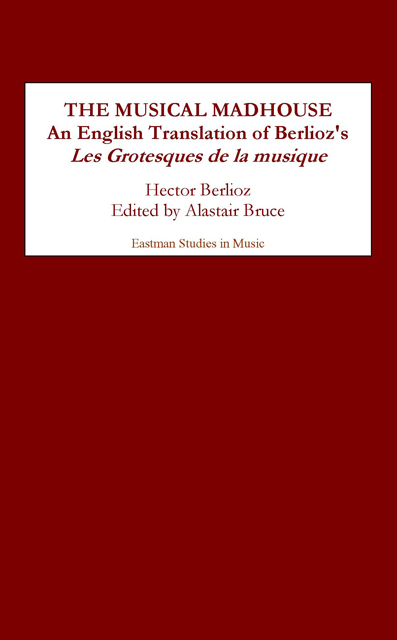Third letter—Lille; Arras
Published online by Cambridge University Press: 21 March 2023
Summary
Lille—An improvised cantata—Melancholy—The half-moon at Arras—Artillery pieces—Linstocks—The rocket—A terrific effect—The autograph collector
Paris, 18 …I don’t expect you have any desire to know why I went to Lille. I’ll tell you anyway. It was nothing to do with the Festival of the North, directed by Habeneck, in which the Lacrymosa from my Requiem was performed twice, in grand and beautiful style, I’m told. The Festival organisers forgot to invite me, which amounted to an invitation for me to stay in Paris.
No, I only went to Lille some years later. The Northern railway, so celebrated for the little accidents to which it was prone, had just been completed. His Grace the Archbishop was to give it his solemn blessing, which promised to be an occasion for copious eating and drinking. It was thought a spot of music would not go amiss—rather the opposite, since many people need it as an aid to digestion. So it was decided to approach me, as a firstrate digestive.
Don’t laugh, that’s exactly what happened. A cantata was needed, to be performed, not after dinner, but before the opening of the ball. Monsieur Dubois, charged by the Municipality of Lille with the musical arrangements for the ceremony, came to Paris in a great hurry and with the old-fashioned, antediluvian, scarcely credible notions he brought with him from the provinces imagined that, since he needed words and music for this cantata, it wouldn’t be a bad idea to approach a literary man and a musician. As a result, he commissioned Jules Janin for the verses and me for the music.
Only, when he brought me the words of the cantata, Monsieur Dubois informed me, as if the piece in question were a mere five-act opera, that my score was needed in two days’ time. “Very well, Monsieur, I shall meet your deadline; but if you find you need it tomorrow, don’t hesitate to tell me.” I’d just read Janin’s verses; they were fashioned in a certain manner which I shan’t attempt to characterise, but which attracts music like ripe fruit attracts birds, quite unlike the great volleys of hemistichs which professional librettists fire off as they beat out the coverts in pursuit of it.
- Type
- Chapter
- Information
- The Musical MadhouseAn English Translation of Berlioz's <i>Les Grotesques de la musique</i>, pp. 177 - 188Publisher: Boydell & BrewerPrint publication year: 2003

